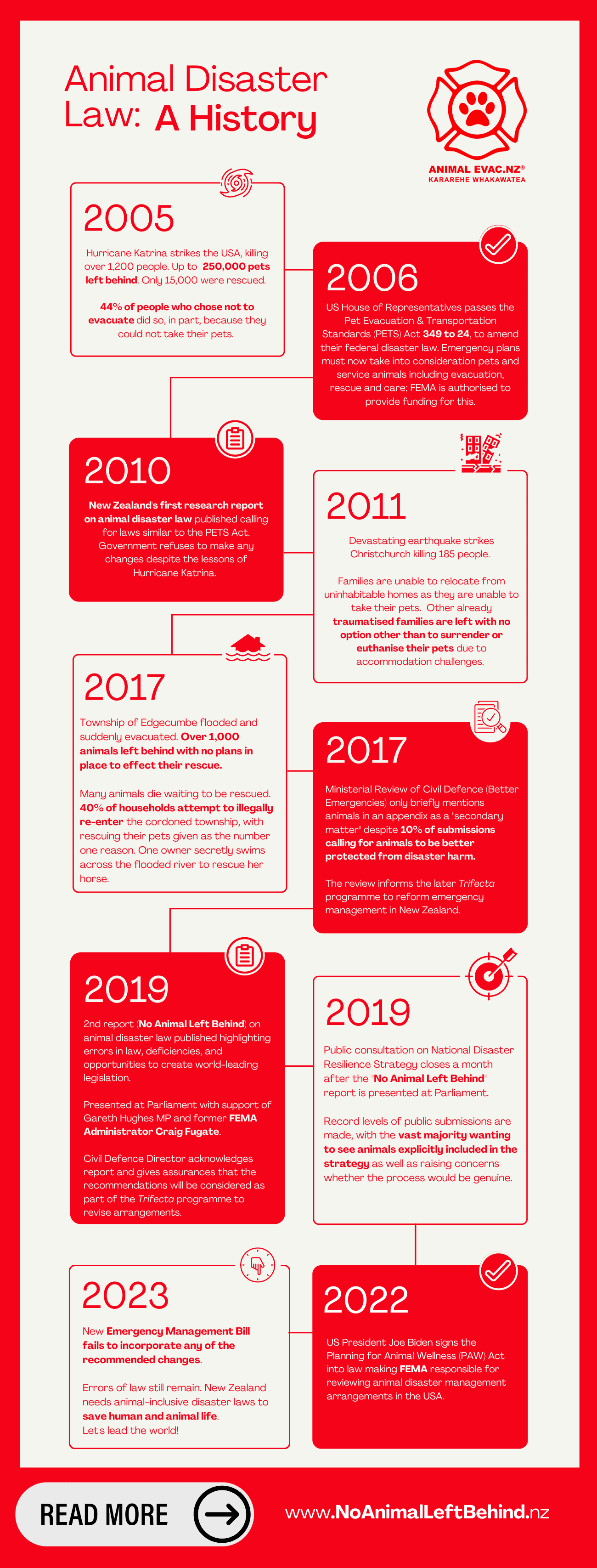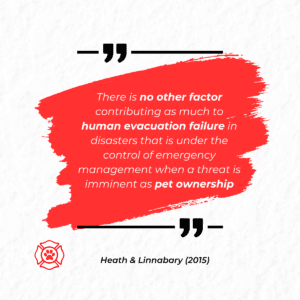New Emergency Management Bill: No Animal Left Behind
“The greatness of a nation and its moral progress can be judged by the way its animals are treated.”
― Mahatma Gandhi
Quick Action
Go to the Emergency Management Bill website, make a written submission (you don’t have to make an oral submission) and in the recommendation section write (or as you deem fit) “I/we support the recommendations made by Animal Evac New Zealand as outlined in their www.NoAnimalLeftBehind.nz campaign”.
Summary
Animal Evac New Zealand (Registered Charity CC55754) was set up in the aftermath of the Edgecumbe Flood because of a significant capability gap and lack of plans and laws to protect animals from disaster harm. Now, with agencies like Fire & Emergency New Zealand (FENZ) establishing national flood rescue and other specialist capabilities, it is time we leave the rescues to the professionals.
Following the flood events earlier this year, Animal Evac New Zealand made the decision to refocus its efforts to champion change for Aotearoa to create world leading animal disaster management law (this link has the full story of our journey). This is perfect timing given the Emergency Management Bill (to replace the Civil Defence Emergency Management Act 2002) is currently out for public consultation.
Despite submissions and reports over the past thirteen years, and the images of Hurricane Katrina etched into our minds, New Zealand has still not modernised its disaster legislation to specifically protect animals from disaster.
Now is the time for change.
We like to see ourselves as world leaders in all things animal, so we are calling on the public to make a submission on the EM Bill to ensure that companion animals during an emergency are:
- Evacuated
- Rescued
- Reunited
and that all animals are better protected from disaster harm.
Submissions
Submissions must be made via the New Zealand Parliament website by 3 November 2023.
We are working on our formal submission and we will publish this here in due course. In the meantime, we need to get kiwis mobilised to get the ball rolling. We want to make it easy for you to give animals a voice, because they can’t vote.
Our recommendations are outlined in the next section. You may agree with all, most, or just a few of them.
- If you agree with all of them, your submission can be simple as copying and pasting the following statement:
“I/we support the recommendations made by Animal Evac New Zealand as outlined in their www.NoAnimalLeftBehind.nz campaign”.
- Alternatively, you are welcome to copy, paste, and edit the recommendations below to reflect the points that you want to include in your personalised submission.
We also encourage you to talk to and/or email your local MP and ask them if they will support better protections for animals in the EM Bill. Find your local MP here.
Recommendations
We wrote a report; in fact one of the world’s most comprehensive reports on animal disaster management! This is where most of the following recommendations come from.
Note that the EM Bill allows for other pieces of legislation to be amended at the same time to ensure consistency of law. Nothing should be out of scope to ensure the EM Bill is modern and reflects society’s expectations.
We recommend the Emergency Management Bill is amended to include that:
- The National Emergency Management Agency is responsible for coordination across all animal-emergency management functions.
- Fire & Emergency New Zealand is mandated and funded to perform companion animal rescue and decontamination (saving pets = saving humans).
- Department of Conservation is obligated to be part of national animal welfare emergency management arrangements (think the Australian bushfires!).
- Ministry for Primary Industries is refocused on non-companion animal emergency management such as livestock, factory farms, zoos, research facilities, and any other sentient animals.
- Area Emergency Management Plans, when approved, must have integrated provisions for the rescue, care, shelter, and transportation of companion animals (just like in the US) and not treated as an afterthought.
- Companion animals are defined in law, consistent with the American SPCA (ASPCA) definition to include dogs (including disability assistance dogs), cats, birds, horses, etc.
- Companion animal welfare costs during an emergency are eligible for central government funding (just like the rest of the family).
- As local government is responsible for companion animal care (not rescue), preparedness costs can be funded from fees collected under the Dog Control Act.
- Companion animals cannot unilaterally be “destroyed” (yes, that is the current language) by Controllers (who have no civil liability). Any instances of this will have safeguards, such as a requirement to consult with a registered veterinarian.
- Commercial animal housing facilities (zoos, laboratories, shelters, feedlots, barns) must have an emergency management plan in place that is checked and is part of the approvals to operate.
- The emergency powers within the Bill are revised to address the inconsistent use of “life” and “human life”; only use “life”, which is defined as any sentient being.
- Requisitioning powers are applicable to the preservation of “life” (which, as above, includes animal life).
- Public transportation can be directed to transport companion animals during an emergency with stipulations as determined by the Controller.
- Controllers (the big cheese during an emergency) have the power to make or revise emergency dog control bylaws during a state of emergency (such as creating temporary dog exercise areas near evacuation centres).
- The removal of collars or other forms of identification from animals, with the intent to hinder the reunion of that animal with its owner, is made an offence (yup, this happens).
- Mandated agencies within national or area plans must carry out an After-Action Report within a prescribed time and format, with such reports being subject to legal deposit.
- Where things, including animals, are “seized”, the Bill provides a process for disposal, e.g. rehoming, transferring, selling (currently they would sit in legal limbo).
- During an emergency, the statutory holding period under the Animal Welfare Act and Dog Control Act for displaced companion animals is extended from 7 days to 30 days (so that in the chaos you have time to find your pet).
- Where reasonable in the circumstances, deceased companion animals be held for 30 days to allow for the body to be reunited with their family.
- The barriers to share information from the National Dog Database and other microchipping databases during an emergency are removed to expedite reunification.
- The Resource Management Act considers the risk of disaster harm to “life” (as above) in its consideration to approve consent, e.g. to avoid situations such as factory farms being built on a flood plain.
- The National Animal Welfare Advisory Committee has a suitable, qualified, and experienced animal emergency management representative to champion disaster risk reduction.
- Microchipping of animals be added as an emergency power in the Bill (currently there are only options such as spray-painting – not ideal)
- The obligation to register a dog in custody (i.e. emergency animal shelter) are exempt during an emergency where such custodians are operating under the direction of the Controller.
- The impersonation or illegal identification of Disability Assist Dogs is made a specific offence (as the civil defence dog tag is the only single tag used consistently across such dogs).
- The current civil defence identification tag for Disability Assist Dogs is protected in any changes.
- Humane trapping may be directed during an emergency, or in the transitional period following an emergency, to secure animals roaming and displaced by the disaster so they can be reunited.
- The Biosecurity Act 1993 is amended to ensure that sufficient plans and arrangements for animals placed put in place by the owner or person-in-charge in the event of an emergency (such as a flood or volcanic eruption).
- That the above is not delayed because of the Select Committee Report of Petition of Erica Rowlands: Mandate the registration and desexing of pet cats and kittens as immediate change protects human and animal life. AENZ recommends that an integrated Act such as a Companion Animal Management Act replaces the Dog Control Act, and this allows for registration of such companion animals to fund local or area companion animal emergency management arrangements.
Timeline

(You are welcome to share this infographic)
Timeline: Supporting Documents
2005 Hurricane Katrina
Filling the Ark
Dark Water Rising (film)
Did Harvey Learn from Katrina? Initial Observations of the Response to Companion Animals during Hurricane Harvey (2018)
2006 US Pet Evacuation & Transportation Standards (PETS) Act
PETS Act Frequently Asked Questions
2010 1st New Zealand report on animal disaster management published
Recommendations to enhance companion animal emergency management in New Zealand
2011 Christchurch Earthquake
Animal welfare impact from the September 2010 earthquake
Animals in emergencies: Learning from the Christchurch earthquake
2017 Edgecumbe Flood
Lessons lost: A comparative analysis of animal disaster response in New Zealand (2020)
It was one of the worst days of my life: Companion animal owners’ experiences of the Edgecumbe 2017 flood in Aotearoa New Zealand (2023)
Wellington SPCA After Action Report: Operation Edgecumbe
Legal Complexities of Entry, Rescue, Seizure and Disposal of Disaster-Affected Companion Animals in New Zealand (2020)
LGOIA Whakatane District Council – no complaints received (2018)
OIA MPI confirms no CIMS incident documentation/decision log maintained for Edgecumbe response (2018)
2017 Ministerial Review of Civil Defence (Better Emergencies)
Wellington SPCA submission on Ministerial Review on Civil Defence
OIA MPI/DPMC animal welfare emergency management costs (2018)
2019 2nd New Zealand report on animal disaster management published
No animal left behind: A report on animal-inclusive emergency management law reform
Law report, video presentation recording and transcript of Craig Fugate, former Director of FEMA (US).
Director of Civil Defence acknowledgement of report.
OIA Director of Civil Defence recommends to Minister that none of the report’s recommendations be included in reforms.
2019 Nelson (Pigeon Valley) Fires
Animal Evac New Zealand After Action Report: Operation Nelson.
OIA NZ Police confirmation no records regarding conduct of volunteers.
2019 National Disaster Resilience Strategy
Presentation to Parliament Select Committee on the National Disaster Resilience Strategy (video and transcript)
Animal Evac New Zealand webpage on the National Disaster Resilience Strategy
OIA of documents relating to National Disaster Resilience Strategy
2022 US Planning for Animal Wellness (PAW) Act
Congresswoman Dina Titus announces passage of PAW Act.
2023 Emergency Management Bill
OIA MPI submission on Emergency Management Bill
Additional Research & Documents
Routledge Handbook on Animal Welfare: Animal welfare in disasters (2022)
No animal left behind: a critical evaluation of the companion animal emergency management framework in New Zealand (2023)
Animal Evac New Zealand Debrief Notes: 2023 North Island Weather Events (2023).
Social Media Resources for Sharing






No animal left behind: Radio advert (.wav)






